nutrient agar plates - Study guides, Class notes & Summaries
Looking for the best study guides, study notes and summaries about nutrient agar plates? On this page you'll find 178 study documents about nutrient agar plates.
All 178 results
Sort by
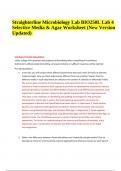 Popular
Popular
-
Straighterline BIO250L Microbiology Lab4 Selective Media & Agar Worksheet (New Version Updated)
- Exam (elaborations) • 16 pages • 2024
-
- $14.49
- 1x sold
- + learn more
Straighterline BIO250L Microbiology Lab4 Selective Media & Agar Worksheet (New Version Updated) In this lab, you will conduct three different experiments that each cover the topic of selective media and agar. How are these experiments different from one another? Explain how the different media in each experiment are utilized in the context of selective vs differential media. The precise goals and kinds of microorganisms each experiment aims to isolate vary. The selection of media is based on...
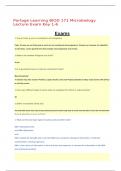
-
Portage Learning BIOD 171 Microbiology Lecture Exam Key 1-6
- Exam (elaborations) • 28 pages • 2023
- Available in package deal
-
- $14.49
- 1x sold
- + learn more
Portage Learning BIOD 171 Microbiology Lecture Exam Key 1-6 Exams 1. What are the two major types of nucleic acids and their roles? DNA- deoxyribonucleic acid RNA- Ribonucleic acid DNA- Cellular life has DNA and a role that DNA has is long-term storage of information, it holds the characteristics of living organisms. RNA- Is the carrier of information in form of amino acid sequence. It converts the information in the DNA and synthesizes proteins Tru...
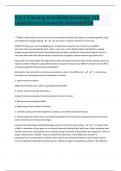
-
6.2.1 Cloning and Biotechnology 119 (questions) Correctly Solved|2024
- Exam (elaborations) • 25 pages • 2024
- Available in package deal
-
- $8.49
- + learn more
***Make a flow chart to show how you would calculate the affect of a factor on bacterial growth using serial dilutions and agar plating - ️️set up series of cultures identical in every way EXCEPT for factor you are investigating e.g., temperature, presence of a nutrient or antibiotic etc>culture for several days>for each culture carry out a serial dilution>plate each dilution, making streaks on agar plate with sterile inoculating loop and label carefully to show which original cult...
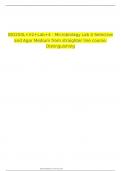
-
BIO250L+V2+Lab+4 - Microbiolagy Lab 4 Selective and Agar Medium from straighter line course. Distinguishing
- Exam (elaborations) • 14 pages • 2024
-
- $14.49
- + learn more
Student Name: Ashley Anderson. Access Code (located on the underside of the lid of your lab kit): AC-VRIKUTP. Pre-Lab Questions 1. What is the difference between chemically defined and chemically complex media? Give either a clinical or environmental research example for which each media type would be the most appropriate choice for culturing microorganisms. Chemically defined media is media where the exact chemical compositions are known and made with purified ingredients. This type of...
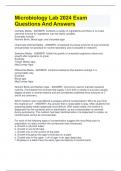
-
Microbiology Lab 2024 Exam Questions And Answers
- Exam (elaborations) • 12 pages • 2024
-
- $10.69
- + learn more
Microbiology Lab 2024 Exam Questions And Answers Complex Media - ANSWER- Contains a variety of ingredients and there is no exact chemical formula for ingredients (can be highly variable). Examples include: Nutrient Broth, Blood agar, and chocolate agar. Chemically Defined Media - ANSWER- Composed of precise amounts of pure chemical and generally not practical for routine laboratory use (invaluable in research) Selective Media - ANSWER- Inhibit the growth of unwanted organisms (allow o...
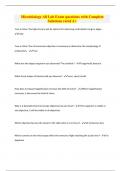
-
Microbiology All Lab Exam questions with Complete Solutions rated A+
- Exam (elaborations) • 18 pages • 2024
-
- $8.99
- + learn more
True or false: The high-dry lens will be optimal for observing multicellular fungi or algae. - False True or false: The oil immersion objective is necessary to determine the morphology of prokaryotes. - True What was the largest organism you observed? The smallest? - Fungi/mold; bacteria What three shapes of bacteria did you observe? - cocci, spiral, bacilli How does increased magnification increase the field of vision? - When magnification increases, it decreases the field of vision Why...
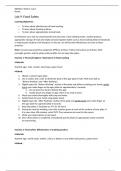
-
BIOS 242 Week 5 Assignment; Lab 9 of 14 Onsite; Food Safety.
- Other • 7 pages • 2024
-
- $9.99
- + learn more
BIOS 242 Week 5 Assignment; Lab 9 of 14 Onsite; Food Safety. Lab 9: Food Safety Learning Objectives: To learn about effectiveness of hand washing To learn about cleaning produce To learn about appropriately storing foods GI infections occur due to contaminated food and water. Clean drinking water, washed produce, appropriate storage of food and simple personal hygiene habits such as hand washing help tremendously in reducing the incident of GI infections. In this lab, we will test the ef...
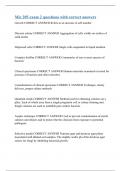
-
Mic 205 exam 2 questions with correct answers
- Exam (elaborations) • 11 pages • 2023
- Available in package deal
-
- $15.49
- + learn more
Growth CORRECT ANSWER Refers to an increase in cell number Discrete colony CORRECT ANSWER Aggregation of cells visible on surface of solid media Dispersed cells CORRECT ANSWER Single cells suspended in liquid medium Complex biofilm CORRECT ANSWER Community of one or more species of bacteria Clinical specimens CORRECT ANSWER Human materials examined or tested for presence of bacteria and other microbes Considerations of clinical specimens CORRECT ANSWER Technique, timely delivery, ...
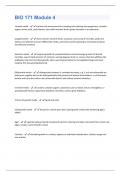
-
BIO 171 Module 4 Exam Questions With Complete Answers!!
- Exam (elaborations) • 6 pages • 2024
- Available in package deal
-
- $7.99
- + learn more
Growth media - nutrient-rich environment for isolating and culturing microorganisms, includes sugars, amino acids, and vitamins, also called nutrient broth, grows microbes in a suspension Lysogeny broth - most common nutrient broth, can grow a vast array of microbes, plates are yellow, non-selective and non-differential media, commonly used for growing e coli (easily produces recombinant proteins) Selective media - suppress growth of unwanted bacteria and encourage growth of desired microb...
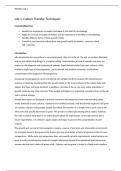
-
BIOS 242 Week 1 Assignment; Lab 1 of 14 Onsite - Culture Transfer Techniques
- Other • 9 pages • 2024
-
- $9.99
- + learn more
Lab 1: Culture Transfer Techniques Learning Objectives: Identify the importance of aseptic technique in the field of microbiology Apply the concept of aseptic technique and its importance in the field of microbiology. Identify different forms of basic growth media Transfer a pure bacterial culture from one growth media to another, a process called sub- culturing. Introduction: Microorganisms are everywhere in our environment; they are in the air, the soil, on surfaces (fomi...

Did you know that on average a seller on Stuvia earns $82 per month selling study resources? Hmm, hint, hint. Discover all about earning on Stuvia


